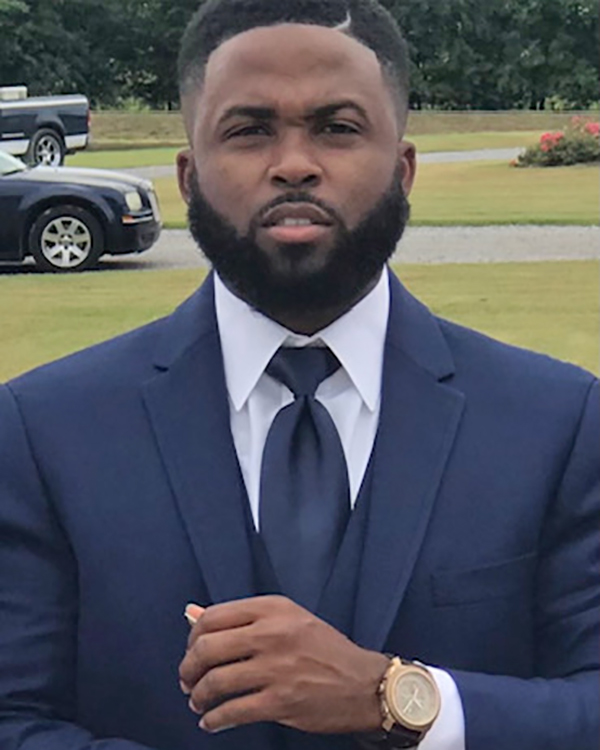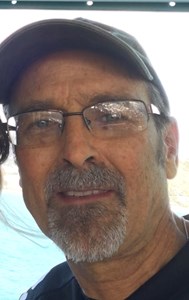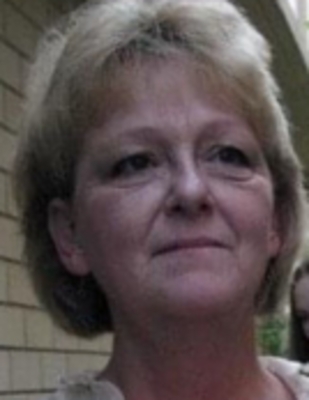Who is Carl Cavalier and why did he speak out?

Pride. Love. Disappointment. Frustration. Anxiety. Fight.
Those are the words that come to mind upon entering Carl Cavalier’s home.
Support our publication

There is the poster-sized photo of Trooper Cavalier in his uniform. Signed by dozens of friends and family, framed and hung at the entry of his home, it celebrates his graduation seven years ago from the Louisiana State Police Academy. He is still proud of that moment.
The state police academy is not for the faint of heart, he says. While he was there, Cavalier says there weren’t very many Black trainees. He was one of just a handful, and some of them dropped out along the way. It was a training regimen that Cavalier says was designed to “break you down and rebuild you” in the image of what it means—or at least, what it is supposed to mean—to be a Louisiana state police officer.
He credits a “tough skin” and his prior law enforcement experience as attributes that helped him stick it out.
He also stuck it out because he saw law enforcement as his way out. He alludes to this in his book, NWB, about Elijah Steele, the fictionalized character whose saga about what it is like to be a Black police officer is loosely based on his own experiences. In the book, Steele’s first job as a corrections officer for a small town outside of New Orleans meant that he would have a regular paycheck, health insurance and retirement account. There was only a handful of family members that he could recall having a steady job with benefits . . . so this was his chance “to break the “f***ed up cycle of being on the wrong side of the law or the wrong side of life,” the author writes.
The love can be seen in the pictures of Cavalier, his longtime girlfriend and their four children prominently displayed on walls and a mantle. He will says that his four Black babies are a big part of what motivated him to cross that not-so thin blue line, spurring his decision to speak publicly about the murder of Ronald Greene at the hands of fellow state troopers. As a Black father to Black children, especially young Black boys, he could not be silent about the gruesome and unwarranted killing of a Black man, even if those who were responsible for his death wore the same uniform as he did.
Or maybe, it was that he couldn’t be silent precisely because those men responsible for Greene’s death wore the same uniform. And that notion brings with it the disappointment and frustration. Just in case you miss them in his voice, they too are on display in the form of a compelling piece of artwork, “Nigger with a Badge.” Shortened to just initials, NWB is the title of Cavalier’s book written under pseudonym Elijah Steele, which is also the name given to the book’s protagonist.
The original artwork for the book’s cover, created by Dwayne Michael Collins, Jr., hangs on a wall in Cavalier’s living room. It depicts a Black state police officer hanging from noose surrounded by the names of Black people killed by police officers or White vigilantes. The officer in this painting is not going quietly though. He is pulling at the rope, trying to unloosen its death grip.
As for the anxiety, one might think that with a veteran Louisiana state trooper in the cul de sac just yards away and another trooper living just around the corner, Cavalier would feel safe in his quiet neighborhood. He doesn’t—not completely anyway. There was the cryptic e-mail from “someone from up north that he doesn’t even know” accusing him of trying to start a race war. Cavalier also says his kids were a little confused when state troopers showed up at the door to serve their dad with paperwork regarding his suspension and other actions. Those officers, dressed in a uniform just like the one their daddy wears, were now at the door to deliver troublesome news to their father—a confusing site for any youngster, Cavalier says.
Though there have been no overt, physical threats against him or his family, trust is a rare commodity, these days. So, a television monitor displays eight different angles from cameras he positioned outside of his home about five months ago—a precautionary measure to ensure their safety.
Now let’s talk about the fight.
Despite media reports that tell that he was fired from the Louisiana State Police, when The New Orleans Tribune sat down with him in early November, he was still a state trooper employed by the agency—at least technically. He was however suspended and had been put on notice that he would be terminated from his post after his 200-hour suspension, which is set to expire in mid-November, he says. By the time this edition of The Tribune hits the streets, Cavalier’s suspension will likely be up and he could be officially fired, but he will fight that. He wants his job.
“I am fighting it now,” he says. “They gave me my first hearing date in April. Now the public may not understand this, but what they are trying to do is make me sit longer without any money coming in.” Pushing his hearing out nearly five months after his effective termination is a tactic to break him financially, says Cavalier.
Who is Carl Cavalier?

For those who haven’t heard of Cavalier, read about him in local papers or heard him share his story on the local WBOK 1230 AM or nationally with Don Lemon on CNN, the short answer is this: Trooper Cavalier is the officer that spoke publicly about and condemned the killing of motorist Ronald Greene and has since come under fire for doing so. Several media outlets have reported that he is the source of leaks of internal Louisiana State Police files and recordings related to Greene’s death, though he has never publicly acknowledge that as fact.
There is a more complex and layered answer to the question of “Who is Carl Cavalier?” And it doesn’t begin with him speaking out against fellow officers and the very agency of which he is a part about the Ronald Greene killing. It doesn’t even begin the complaints he lodged about what he believed was unfair treatment that he was facing within the department, particularly while serving in the agency’s Troop C division.
It begins with a little boy, growing up on the westbank of Jefferson Parish, raised mostly by his grandmother as both his parents struggled with addiction and incarceration. He will tell you that it wasn’t until an aunt took him in and exposed him to possibilities outside of the reality to which he had grown accustomed that he could see that there was more to life. Not only did he want more, he would eventually see a career in criminal justice as the way he would achieve it.
After graduating from Jackson State University, Cavalier’s first job was as a correction’s officer at the Terrebonne Parish Sheriff’s Officer. Before leaving that agency, he would be promoted from the corrections division to the patrol division. In 2014, after about four years with Terrebonne Parish, Cavalier decided he wanted to join the state troopers and entered the academy. His first job after graduation was with the state police’s Troop C division, based in Houma.
Cavalier says he enjoyed his job at Troop C, mostly working patrol, but soon ran into some challenges after he wrote a ticket to a Houma police officer.
Not being a native of the Houma area, Cavalier didn’t give much thought to the politics of policing there. He says he was just doing his job. Although it is the largest city and the seat of Terrebonne Parish, Houma is a relatively small town with just under 33,800 residents, according to the 2010 Census. It is the sort of place where many of the homegrown residents know each other and each other’s families. But Cavalier was not from Houma. In doing his job, it mattered little to him if the person he stopped for one violation or another had friends at Troop C or whether the person was a police officer with another agency, as was the case with the ticket he wrote to the Houma officer.
That’s when his trouble began. He says he started to get pressure and unfair criticism about the way he was doing his job. His tickets and reports were being scrutinized. His body cam footage was being unnecessarily examined. He also started to face reprimands for practices that he says were widespread and generally accepted. Although it is technically a violation—at least on paper—for an officer to use his patrol for personal travel, it’s a slight that is often overlooked, says Cavalier. He says he had gotten an unofficial nod to use his car to travel to a barbering class he was taking out of town. And it wasn’t until he bumped heads with his supervisor over ticketing the Houma PD officer that the use of the car became an issue. Then he was reprimanded for wearing his uniform into a local store. He even cited instances of his family members being targeted for minor traffic violations.
But Carl Cavalier is a fighter, so he pushed back against the reprimands and other acts that he saw as retaliation. He sued for discrimination and harassment.
Soon some superior officers, who happened to be Black, presented him with an opportunity to transfer out of Troop C, to the agency’s headquarters in Baton Rouge, first to the Narcotics Division and then to the Gaming Division, he says, adding that the thinks it was their way of helping him by getting him out of the line of fire and ire from his commanding officer with the hopes that he would drop his claims against the department.
Still, the transfer meant waking up as early as 5 a.m. each day to make the nearly two hour commute to Baton Rouge from Houma, where the rest of his family had settled into work and school. So he made the sacrifice to continue his career away from what was a growing hostile environment in Troop C despite the long commute.
And he enjoyed the new role with the state police. But a few things gnawed at him, he says. First, he could not shake the double standard in the way Black and White motorists were treated. Also, he experienced the difference in the way Black troopers were treated in comparison to their White counterparts, he says. He did not like the way he was targeted by his commander for simply doing his job. And he was especially unnerved by what he saw as a lack of support on the part of other Black troopers to be more vocal about the improprieties, he says.
Many of those Black troopers would admonish him to pick his battles, telling him “that game was chess not checkers,” Cavalier says. Of course, the overused axiom about board games is often used to compare one thing as being more complex and strategic in nature than another. So to speak, it is a way to tell a person to slow down and to not be so quick to cause trouble or demand change.
This Ain’t No Board Game
But consider that with the hiring of 32-year-old Marine veteran Abraham Bowie in 1970, Louisiana got its first Black state trooper more than 45 years before Carl Cavalier entered the training academy.
Now tack on the roughly 250 years that slavery existed in America, then stir in the succeeding 100 years of oppression, segregation and inequality legalized under Jim Crow.
Now throw in the remnants of inequity and injustice that have festered for 50 years—the result from 400 years of institutional racism.
That’s a long game of chess by any standard, with Black America at the wrong end of a perpetual checkmate.
So if the discrimination and harassment that he was personally experiencing were not enough to trouble Cavalier, the more he learned about the way some Black and Brown motorists stopped by troopers across the state had been and were being treated—unarmed victims of excessive force, beaten and even killed by those sworn to protect and serve—Carl Cavalier felt increasingly compelled to say something, to do something.
Cavalier is aware that there might be detractors who suggest that he has only spoken out about the killing of Ronald Greene as a way to strike a blow against the department for the discrimination and harassment he has personally faced.
“I would say those people are blind,” Cavalier says. “I would say that is a way of defending the Louisiana State Police. That’s a slap in the face of every Black officer, and a person who truly feels that way is walking blindly in the face of reality in this country. But those are the whispers, people know what’s really going on.”
But for argument’s sake what if there was even a little bit of validity to those whispers. What if Cavalier was lashing out because he was frustrated by the proverbial game of chess he was expected to endure? The real question is why should Ronald Greene’s family have to play at all.
Who was Ronald Greene?
To fully appreciate who Cavalier is, one must also know who Greene was or at least what happened to him and at whose hands.
Greene was the unarmed 49-year-old Black man that died after being arrested by Louisiana State Police on May 10, 2019, following a high-speed chase outside of Monroe, La., where the departments Troop F is stationed. During the arrest, Greene was stunned, punched, placed in a choke hold, and dragged face down while handcuffed and shackled. He was left face down for at least nine minutes, dying from his injuries.
At least six White troopers were involved in the arrest; and at first, they tried to say his death was from injuries he sustained in a car crash. It was a declaration that was questioned by medical personnel at the hospital where Green’s dead body was taken, with at least one physician writing on his report that the officers’ tale—Greene dying after from injuries sustained when his car struck a tree—did not add up.
Still, the officers lied about having body camera footage of the arrest. Their reports did not mention a struggle with police or the use of force. The initial Union Parish coroner’s report attributed his death to the car crash and a heart attack and mentioned the levels of cocaine and alcohol in his system, but nothing about the stun gun wounds or injuries consistent with being punched, dragged or choked.
Greene’s family filed a lawsuit against the state police for wrongful in May 2020. With the gruesome images of Greene’s injuries and photos that showed minor damage his vehicle, they, too, knew that something didn’t add up.
Meanwhile, there were leaks coming from inside the state police force that helped support their case. According to a media report published by Yahoo! News in July 2021, Greene family attorney Ron Haley said internal memos, recordings, and other evidence from Greene’s arrest was being leaked to the media and other parties dating back to late 2020.
Finally the state police opened an administrative investigation into Greene’s death in August 2020, followed by a federal civil rights probe in September 2020.
To date, the state police department has not disciplined John Clary for any of his actions related to Greene’s death, despite the fact that he was highest-ranking officer at the incident and lied when he told investigators that he had no body camera video Greene’s arrest, according to reports. In fact, the worst thing that The Tribune can determine to have happened to Clary as a result of his involvement in Greene’s death is his removal from a volunteer detail escorting Louisiana Tech’s football coach—an unpaid assignment that carries nothing more than a little notoriety for the officers chosen. To be clear, even his removal from this detail had little to do with his role in Greene’s death. As one media report tells it, officials simply thought it was a bad look to have Clary remain on the “prestigious” amid ongoing investigations.
Meanwhile, one officer, Chris Hollingsworth was recommended for termination. But he died from injuries in a single-car accident just hours after learning that he would be fired for his role in Greene’s death. Another officer Kory York was suspended without pay for 50 hours for dragging Greene and improperly turning off his body camera. Another, Dakota DeMoss, received letters of “counseling” and “reprimand” for violating rules about courtesy and recording equipment in the arrest of Greene. DeMoss would later be arrested in February 2021 for using excessive force in the unrelated May 2020 arrest of another motorist, Antonio Harris, where it was found that Harris never resisted arrest, as DeMoss falsely claimed, had surrendered and was face-down on the ground when DeMoss began to beat him. Similar to his actions in the Ronald Green case, DeMoss turned off his body camera. DeMoss was fired in June 2021.
And it is not enough.
Local and national civil rights leaders along with elected leaders don’t just want federal probes into Greene’s death, which have been launched. Indictments of individual officers brings some measure of justice in cases of police brutality, but it’s not enough. Reprimands and firings are not sufficient. They are calling for a widespread investigation into the practices of the Louisiana State Police, with some ultimately wanting the Louisiana State Police to be placed under a U.S. Department of Justice consent decree, much like the ones that the New Orleans Police Department and the Orleans Parish Sheriff’s Office are under.
When the U.S. Department of Justice in September 2021 indicted former state trooper Jacob Brown for the 2019 beating of motorist Aaron Bowman, the Urban League of Louisiana issued this statement:
“We applaud the Department of Justice regarding today’s indictment of Jacob Brown, former Louisiana State Police trooper, for the 2019 beating of Aaron Bowman following a traffic stop. Much like the case involving Ronald Greene, a deeper investigation followed the release of graphic body camera footage withheld for more than two years. The footage shows Trooper Brown striking Mr. Bowman 18 times with a flashlight, which the trooper later attempted to justify as “pain compliance.” We commend the federal grand jury in Shreveport, Louisiana, who brought the excessive force charges against Trooper Brown. We again call for a full patterns and practices investigation of the entire department.”
Following the Ronald Greene killing and the fallout, members of the New Orleans City Council have called for a widespread investigation of the state troopers as has Congressman Troy Carter.
The Officer and The Activist
It definitely is not enough for Cavalier.
To be sure, Cavalier feelings about the fallout (or lack thereof) related to Ronald Greene’s death are no secret. Whether he was a source of the leaks or not, he has been vocal about Greene’s death.
In an interview with Baton Rouge WBRZ, he said “we still have murderers, in my eyes, on the job. Guys who received a slap on the wrist for their roles in the Ronald Greene incident are unpunished…patrolling the streets and left on the job.”
The inequity and racial overtones of it all isn’t lost on Cavalier. As a officer on patrol in Troop C, he faced discipline measures over the use of his patrol car and wearing his uniform in public while off duty and locked horns with his supervisor for not bowing under pressure over who got tickets, while troopers that stunned, choked and dragged a man to death and then covered it up and lied about it were still on the job.
In Cavalier’s eyes, the officers who participated in the arrest that resulted in Greene’s death should be fired at minimum.
At most, they should all face arrest in a court of law—that is, after all, what happens to those accused of murder.
And Cavalier is still speaking out. He tells The Tribune that the killing of Greene and the beatings of Bowman and Harris are just the cases that the public has heard over the last few years. There are others, he says. That’s part of the reason he wants his job back. Not only does Cavalier assert that he should not be fired for speaking the truth about wrongdoing, about a cover-up, about the murder of an unarmed Black man, he says he would do it again.
He also says he still loves his job. Imagine that.
And, there is another reason he wants back on the force. He wants the officers—both Black and White—who have ostracized him to have to deal with him, to have see him every day. He even wants to ask them a question: Why didn’t they stand up on the side of truth and justice?
If he had to do it again, Cavalier says he might have stayed in the shadows a little longer instead of speaking publicly when he did, a move he thinks would have given him more time to financially prepare for the battle ahead.
But eventually, he would have spoken out.
As much as wants to return to the Louisiana State Police Force, he is already preparing to enter law school. Either way, he says the Louisiana State Police will have to reckon with him as a trooper not afraid to call out injustice from the inside if he wins his appeal against his termination or, eventually, as an attorney ready battle injustice from the outside.
“Either way, they are going to have to deal with me,” he says.



